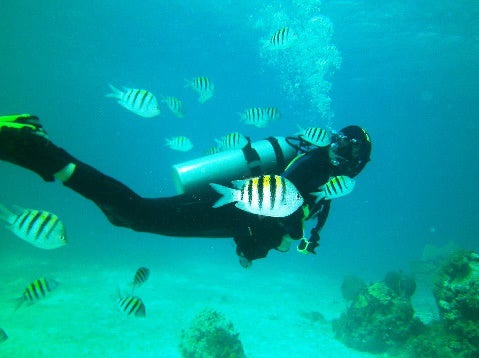
There are not many courses that offer as much as Shawn Simonson’s Hyperbaric Physiology course. In this interdisciplinary graduate course, students learn about the physiological changes that occur while diving, the physics of underwater environments, the oceanic flora and fauna adaptations to the pressure in the sea, and the unique ecosystem that exists in the sea, including how lifestyles above water may impact the oceanic environment.
One student said that “the learning that took place throughout the class may not have been 100 percent applicable to the purpose of students in the exercise/kinesiology degree but I think that made the class more important and more applicable to growing up and life in general. We can learn from a book all day long but experiences often teach us more important lessons not found in books.”
Simonson, an associate professor in the School of Allied Health Sciences Department of Kinesiology, is partnering with Mary Branchflower, Dive Magic PADI course director, for this thorough course about the underwater world. In addition to studying human anatomy and physiology, exercise physiology, physics and biology, the students will earn their PADI Open Water Scuba certification so that they can experience what they’ve studied first hand in Roatan, Honduras at the end of the term.
The course is being offered in the fall of even years; this is the second fall that students have had the opportunity to take this unique course. There are still six slots available to students and interested faculty and staff. The students who took the course two years ago in fall 2014 raved about their experiences and encourage other students to take this life-changing course.

One student said, “the greatest lesson learned was diving into and discovering a whole new physiological realm (pun intended). The human body is so fascinating and to realize that extra pressure can alter the physiology of well-oiled machines is fascinating.”
Another student expressed amazement about the ocean: “the immensity and strength of the ocean is unreal. With that said, the aquatic life is so dependent upon the ocean waters that small changes can have huge impacts. Life outside of the coral reefs was much scarcer than I had expected.”
Other students found new perspectives while at sea: “There is more life down there than I imagined. It’s amazing that so much can live and thrive in such an environment. The currents made swimming for us very difficult but the fish were just cruising along like it was no big deal. The coral was amazing. They were huge, extremely diverse, and home to so much life. Seeing what is in the oceans makes me really appreciate the opportunity to dive in such an amazing location. As well, it makes me really want to protect it. If I want to dive 20 or 30 years from now, the things, we do now will affect the diving then and the (future) life that lives in the oceans.”
As a whole, the students were very grateful to Simonson for organizing the course and the capstone trip. One student summarized this gratitude well, though other students expressed similar sentiments: Simonson “created a priceless, unforgettable, once-in-a-lifetime opportunity for his students. He has birthed many lifelong divers and adventurers from this trip. He has fostered learning about hyperbaric physiology but also about the earth, wildlife, and the effects of humans on nature. Through this experience, I hope I speak for everyone when I say he has awakened an appreciation and a sense of wonder for the world we inhabit.”
As this unusual learning experience does cost more than an average class, Simonson and the Boise State University Foundation are seeking charitable contributions from individuals interested in partnering with this fantastic experience. Even a modest contribution could make the difference for a student struggling to cover the cost of this trip and every dollar is greatly appreciated. Donations make a huge difference for students; scholarships allow students to focus their time and attention on learning without worrying about how to finance their education. To donate to this life-changing course, contact Jon Larkin, development director for the College of Health Sciences, at JonLarkin@boisestate.edu or 208-426-2124, visit the PonyUp webpage in October, or choose the Kinesiology Hyperbaric Physiology Fund from the drop down menu on the Online Giving webpage.